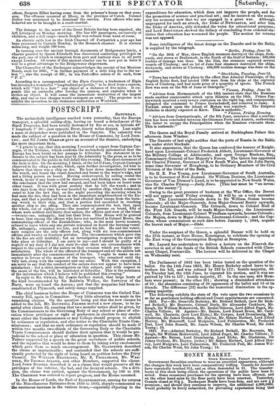The Parliament of 1852 has been twice tested on the
question of the ballot. On the 14th June 1853, Mr. Henry Berkeley asked leave to in- troduce his bill, and was refused by 232 to 172; hostile majority, 60. On Tuesday last, the 13th June, he repeated his motion, and it was ne- gatived by 194 to 157; hostile majority, 37. In the one case' 404 Mem- bers were present; in the other 351; showing a diminished attendance of 53 • the absentees consisting of 38 opponents of the ballot and 15 of its friend's. The difference (23) marks the numerical diminution in the op- posing majority.
The following exhibits the state of the vote upon the two occasions in so far as gentlemen holding official and Court appointments are concerned. 1853. For—Mr. Grenvilfe Berkeley, Mr. Richard Bethell, (now Sir Rich- ard Bethell,) Mr. Bouverie, Colonel Boyle, Sir Alexander Cockburn, Mr. Keogh, Sir William Molesworth, Mr. Bernal Osborne Lord Alfred Paget, Mr. Charles Villiers; 10. Against—Mr. Baines, Lord Ernest Bruce, Mr. Card- well, Mr. Charteris, (now Lord Elcho,) Mr. Cowper, Lord Drunilanrig, Mr. Gladstone, Sir James Graham, Mr. Hayter, Mr. Sidney Herbert, Lord Alfred Hervey, Mr. Moncreiff, Lord Mulgrave, Lord Palmerston, Mr. Frederick Peel, Lord John Russell, Mr. James Wilson, Sir Charles Wood, Sir John Young ; 19.
1864. For—Admiral Berkeley, Sir Richard Bethel, Mr. Bouverie, Mr. Keogh, Sir William Molesworth, Lord Alfred Paget, Mr. Charles Villiers ; 7. Against—Mr. Baines, Lord Dramlanrig, Lord Elcho, Mr. Gladstone, Sir James Graham, Mr. llayter, (teller,) Mr. Sidney Herbert, Lord Alfred Her- vey, Lord Mulgrave' Lord Palmerston, Mr. Frederick Peel, Mr. James Wil- son, Sir Charles Wood, Sir John Young ; 14.


























 Previous page
Previous page